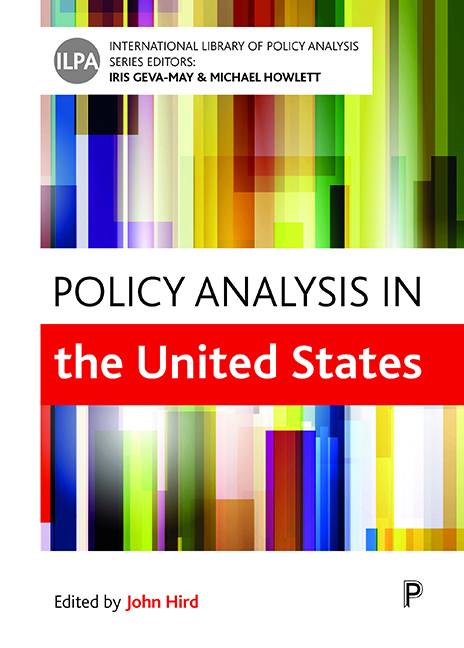Book contents
- Frontmatter
- Contents
- List of tables and figures
- Notes on contributors
- Editors’ introduction to the series
- Introduction
- Part One History, styles, and methods of policy analysis in the United States
- Part Two Policy analysis by governments
- Part Three Policy analysis outside of government
- Part Four Policy analysis education and impact internationally
- Index
Nine - Policy advisory committees: an operational view
Published online by Cambridge University Press: 12 April 2022
- Frontmatter
- Contents
- List of tables and figures
- Notes on contributors
- Editors’ introduction to the series
- Introduction
- Part One History, styles, and methods of policy analysis in the United States
- Part Two Policy analysis by governments
- Part Three Policy analysis outside of government
- Part Four Policy analysis education and impact internationally
- Index
Summary
Introduction
Advisory committees are part and parcel of policy making for nearly 50 federal agencies ranging from the vast Department of Defense to the tiny Administrative Council of the United States. Advisory committee input is used at many levels ranging from the development of high-level strategic initiatives, as vehicles for research community input, to program prioritization efforts, as instruments of program evaluation, all the way down to the provision of input on very narrowly defined decisions, such as the peer review of individual research proposals. Regulatory agencies, particularly those with responsibility for human health and the environment, rely heavily on advisory committees for the production of scientific assessments that inform the setting of standards (Jasanoff 2009).
In practice, there are many reasons that advisory committees are used by the federal bureaucracy. Fleisher provides a conceptual framework which situates federal advisory committees in the broader policy context whereby government agencies use input from the advisory committees to mediate the pressures they feel from other government policy makers, such as Congress or the Executive Office, and advocacy groups as they run their policy formulation, implementation, and policy revision processes (Fleisher 2015). Moffitt provides an excellent and sweeping overview, arguing that advisory committees are used to manage agency reputation, avoid ‘embarrassing situations,’ to compensate for deficiencies in agency knowledge, and to redress agency weakness that derives from instability or tumult inside the agency (Moffitt 2010).
In the United States the process whereby advice is sought from advisory committees is strictly regulated by the Federal Advisory Committee Act (FACA) of 1972 (Bybee 1994; Ginsberg 2009), with oversight of these committees provided by the General Services Administration's (GSA) Committee Management Secretariat. The GSA characterizes advisory committees according to the following uses: (i) national policy issues, (ii) non-scientific programs, (iii) scientific technical programs, (iv) grant recommendations, (v) regulatory negotiations, (vi) special emphasis areas, and (vii) other. The Federal Advisory Committee Act Amendments of 1997 (P.L. 105-153) amended FACA to govern agency use of reports provided by the National Academy of Sciences and the National Academy of Public Administration.
Advisory committees are numerous and engage a large number of people in providing advice to government. In 2016 there were approximately 1,000 active FACA committees used by about 50 federal agencies, costing $339.6 million (General Services Administration 2016).
- Type
- Chapter
- Information
- Policy Analysis in the United States , pp. 173 - 182Publisher: Bristol University PressPrint publication year: 2018



